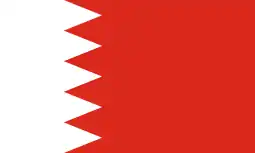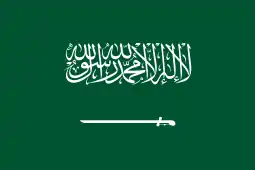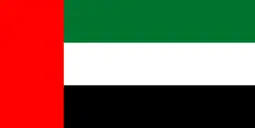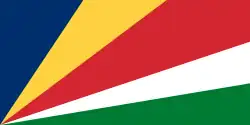International Maritime Security Construct
The International Maritime Security Construct (IMSC) is a consortium of countries whose official stated aim is the maintenance of order and security in the Persian Gulf, Gulf of Oman, Gulf of Aden and Southern Red Sea, particularly regarding maritime security of global oil supply routes.[1] It was formed on 16 September 2019 in Bahrain, by the United Kingdom, Australia, Albania, Saudi Arabia, Bahrain, Lithuania, the United Arab Emirates, and the United States. The operational arm of the IMSC is Coalition Task Force SENTINEL (CTF SENTINEL).[2][3][4][5][6]
| التحالف الدولي لأمن وحماية حرية الملاحة البحرية (Arabic) al-Tahaluf al-Duwaliu Li'amn Wahimayat Huriyat al-Milahat al-Bahria | |
.png.webp) | |
 Current members Former members | |
| Formation | September 16, 2019 |
|---|---|
| Type | Military coalition |
| Headquarters | Manama, Bahrain |
Region | Persian Gulf |
Membership | |
Official language | English |
| Website | www |
The security construct was formed by U.S. in 2019 after oil tankers were allegedly attacked by Iran. The coalition also aims to address the oil tankers seizure by Iran in the region's waters.[3] The IMSC's primary task is monitoring international waters of the region to ensure the freedom of navigation of merchant vessels plying their trade in the area.
Formation
Early in summer 2019 near the Strait of Hormuz, a Norwegian tanker and a Japanese tanker were attacked, and the British tanker Stena Impero was seized by Iranian naval forces.[4]
Shortly thereafter, the IMSC was formed "in support of regional and international efforts to deter and counter threats to maritime navigation and global trade in order to secure freedom of navigation in the Gulf amid heightened regional tensions after attacks on oil tankers that were widely blamed on Iran, as well as to address Iran's illegal seizure of tankers in the region."[3] Several Persian Gulf countries signed on to IMSC in mid-September in the wake of Iranian cruise missile attacks on the Saudi Arabian Abqaiq oil facility.[5] It was joined by countries from the Baltics in 2020.[8]
U.S. Air Force General Paul Selva, Vice Chairman of the U.S. Joint Chiefs of Staff, describes the purpose of the IMSC as protecting the freedom of navigation in the waters of the region and the commander of U.S. Naval Forces in the Middle East defines its role as strictly defensive.[1]
IMSC is a flexible and temporary construct that can scale operations to conditions in the maritime environment. There are currently eight nations supporting IMSC, with several other nations in various stages of joining the organization. The IMSC is not part of the U.S. Maximum Pressure Campaign against Iran and does not play a part in United Nations sanctions enforcement against any nation. IMSC has no affiliation to any political agenda other than protecting freedom of navigation on the high seas. Ships, aircraft, and maritime forces for IMSC are sourced from Coalition force contributions to operations within the Middle East. Forces supporting IMSC are prohibited from simultaneously accomplishing other national missions that would conflict with the IMSC mandate.
Operations

IMSC, through the operational arm of Coalition Task Force SENTINEL, conducts overt security patrols of the waters of the Persian Gulf, Gulf of Oman, Gulf of Aden, and the Southern Red Sea. Significant maritime industry engagement, reconnaissance, and intelligence support enable the IMSC coalition to target areas of concern, and to accomplish their major objectives of deterring state-sponsored malign maritime activity while reassuring the merchant industry by ensuring maritime security and freedom of navigation.
Command
The IMSC is a political construct of willing nations who share common desires to ensure freedom of navigation within the Middle East, therefore, there is no single IMSC Commander. Command and staffing for the operational arm of IMSC, Coalition Task Force SENTINEL, is shared between coalition countries. Commanders are 1-star navy flag officers nominated from within IMSC Coalition nations and typically serve four to six months terms. Coalition Task Force SENTINEL is headquartered in Manama, Bahrain.
US Navy Rear Admiral Alvin "Bull" Holsey (who concurrently served as Commander of US Carrier Strike Group ONE) assumed command for the formation and development of initial operating capability of Coalition Task Force SENTINEL. He was relieved on January 30, 2020, by Royal Navy Commodore James Parkin (the Commander of the UK Littoral Strike Group).[9][10] At this point, in conjunction with the completion of initial staffing, CTF SENTINEL achieved full operating capability. Parkin handed over command to Royal Navy Commodore Robert Bellfield in April 2020.[11]
| Name | Service | Photo | Term began | Term ended | Notes | |
|---|---|---|---|---|---|---|
| 1. | Rear Admiral Alvin "Bull" Holsey |  | November 7, 2019[12] | January 30, 2020 | Served concurrently as Commander, Carrier Strike Group ONE. | |
| 2. | Commodore James Parkin |  | January 30, 2020 | April 30, 2020[13] | Served concurrently as Commander Littoral Strike Group | |
| 3. | Commodore Robert Bellfield |
| April 30, 2020[13] | November 19, 2020[14] | ||
| 4. | Commodore Craig Wood | .jpg.webp) | November 19, 2020 [14] | March 30, 2021[15] | ||
| 5. | Commodore Adrian Fryer |  | March 30, 2021[15][16] | July 26, 2021 | ||
| 6. | Commodore Gordon Ruddock | July 26, 2021[17] | November 18, 2021 | |||
| 7. | Commodore Donald Mackinnon | November 18, 2021[18] | August 18, 2022[19] | |||
| 8. | Commodore Ben Aldous |  | August 18, 2022[19] | May 17, 2023[20] | ||
| 9. | Commodore Peter Laughton | May 17, 2023 [20] | Incumbent |
Member nations
Current
 Albania - [6] seventh nation to join.
Albania - [6] seventh nation to join. Bahrain - Founding member.
Bahrain - Founding member. Estonia - Estonia joined IMSC in October 2020 as the ninth member.[8]
Estonia - Estonia joined IMSC in October 2020 as the ninth member.[8] Latvia - Latvia joined IMSC on 1 December 2022 as the eleventh member.[21]
Latvia - Latvia joined IMSC on 1 December 2022 as the eleventh member.[21] Lithuania - Lithuania joined the coalition in March 2020 as the eighth member.
Lithuania - Lithuania joined the coalition in March 2020 as the eighth member. Romania - Joined 26 March 2022
Romania - Joined 26 March 2022 Saudi Arabia[3]
Saudi Arabia[3] United Arab Emirates[5]
United Arab Emirates[5] United Kingdom - Founding member.
United Kingdom - Founding member. United States - Founding member.
United States - Founding member. Seychelles - Joined the coalition on 19 October 2022 as the tenth member.[24]
Seychelles - Joined the coalition on 19 October 2022 as the tenth member.[24]
See also
References
- "Maritime coalition launched to protect Gulf shipping after Iran attacks". Arab News. 2019-11-07. Retrieved 2020-01-02.
- "Iran, Russia and China Plan Joint Naval Drill in Gulf of Oman". The Maritime Executive, LLC. 23 September 2013.
- "Saudi Arabia joins international maritime security alliance". Al Arabiya English. 18 September 2019.
- "UAE joins naval security coalition in the Gulf". Sightline Media Group. Defense News. 20 September 2019.
- "UAE Agrees To Join U.S.-Led Maritime Coalition To Protect Gulf Shipping". National Public Radio. 19 September 2019.
- "U.S. Central Command welcomes Albania's participation in the International Maritime Security Construct (IMSC)". U.S. Central Command. 1 November 2019. Retrieved 1 November 2019.
- "The Republic of Estonia Joins the International Maritime Security Construct". DVIDS. Retrieved 24 November 2020.
- "British Officer takes command of Gulf maritime security mission". Retrieved 2020-01-30.
- Lamothe, Dan (January 30, 2020). "Allies hesitated to join a U.S.-led task force protecting ships from Iran. Now a British officer is in charge". The Washington Post. Archived from the original on January 31, 2020.
- IMSC [@IMSC_Sentinel] (3 May 2020). "Welcome aboard Commodore Robert Bellfield as the new @IMSC_Sentinel Commander! Great things ahead for this multinational coalition. #FreedomOfNavigation #GulfSecurity" (Tweet) – via Twitter.
- "New Commander Opens IMSC Command Center". United States Central Command. 7 November 2019.
- "IMSC Holds Virtual Change of Command Ceremony". United States Central Command. 30 April 2020.
- "Coalition Task Force Sentinel Change of Command". DVIDS. DVIDS. 19 November 2020. Retrieved 24 November 2020.
- "Coalition Task Force Sentinel Change of Command". International Maritime Security Construct. 30 March 2021. Retrieved 31 March 2021.
- "85M TONNES OF SHIPPING PASSES THROUGH GULF PINCH POINTS THANKS TO RN-LED TASK FORCE". Royal Navy. Bahrain. 31 March 2021. Retrieved 7 April 2021.
- "Coalition Task Force Sentinel Holds Change of Command". IMSC. 27 July 2021. Retrieved 22 December 2021.
- "New Commander Takes Charge of Coalition Task Force Sentinel". IMSC. 21 November 2021. Retrieved 22 December 2021.
- "International Maritime Security Construct Holds Change of Command". 18 August 2022. Retrieved 3 December 2022.
- "International Maritime Security Construct Holds Change of Command". U.S. Naval Forces Central Command. Retrieved 2023-05-19.
- "Latvia Joins International Maritime Coalition in Middle East as 11th Member". U.S. Naval Forces Central Command.
- "Middle East Naval Coalition Expands with Seychelles as 10th Member". International Maritime Security Construct. 20 October 2022.
- "Australia concludes its contribution to the International Maritime Security Construct". Department of Defence (Australia). 29 December 2020. Retrieved January 8, 2021.
